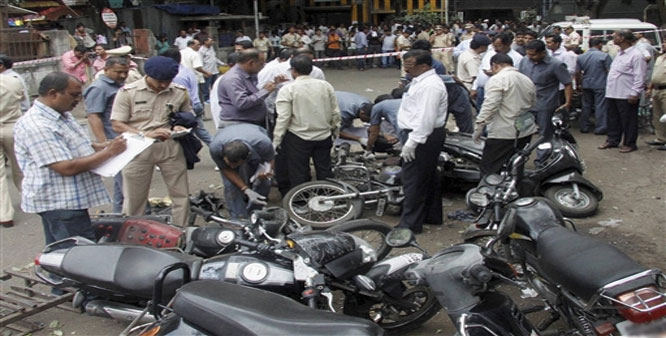 Pune, Jul 11: An uneasy calm prevailed in the city today as people took to their chores, a day after a low-intensity blast rocked the parking lot of a police station here resulting in minor injuries to five persons.
Pune, Jul 11: An uneasy calm prevailed in the city today as people took to their chores, a day after a low-intensity blast rocked the parking lot of a police station here resulting in minor injuries to five persons.
An IED planted on a stolen motorbike exploded in front of the Faraskhana Police Station, located in the sensitive zone which houses the famous Dagadusheth Halwai Ganesh temple, bringing back memories of earlier bomb explosions in the city for which terror outfit Indian Mujahideen was blamed.
Maharashtra Home Minister R R Patil, who visited the blast spot last night, announced handing over the probe to Anti-Terrorism Squad (ATS) while describing the explosion as "suspicious".
While he put the figure of those who sustained minor injuries in the busy square at four, Vishrambaug police officials today said five persons were treated for superficial injuries in hospital and discharged immediately.
The injured included Gulab Khedekar, a constable attached to the Faraskhana Police Station.
According to city Police Commissioner Satish Mathur, the stolen 'Splendour' motorbike belonged to Dada Rajge, a constable in neighbouring Satara who had lodged a complaint of theft on June 25.
The Home Minister said the blast prima facie looked a "deliberate" act to cause panic and added the government will strengthen the ATS team with adequate manpower and senior officers drawn from Pune Police to investigate the incident.
Ball bearings and nails scattered in the area after the blast, that occurred with loud thud and damaged three other adjacent two-wheelers in the parking, have been sent for forensic examination along with other remnants to determine the nature of explosive and the trigger mechanism employed by the culprits.
Mathur said police were "examining all angles and not ruling out any possibility" in the investigation but declined to pinpoint any particular group or individuals behind the incident at this stage.
The CCTV footage available in the area will be examined for clues, he added.
Patil, while urging people to remain calm, said additional CCTV cameras will be installed in sensitive areas of the city before the forthcoming Ganesh festival that draws large crowds, enhancing potential threat to public peace by anti-social elements.





Comments
Add new comment